Commentary on Genesis 7:1
Genesis 7:1 states: "And the Lord said unto Noah, Come thou and all thy house into the ark; for thee have I seen righteous before me in this generation."
Introduction
This verse marks a crucial moment in the narrative of the Flood, emphasizing God's covenant with Noah and the distinction made between the righteous and the wicked in a polluted world. It highlights the importance of obedience, righteousness, and divine protection.
Contextual Background
Prior to this verse, God has outlined the impending judgment upon the earth due to the pervasive wickedness of humanity. The flood serves as both a divine judgment and a means of preservation for Noah and his family, who demonstrated faithfulness amidst a sinful generation.
Verse Analysis
- Divine Command: "And the Lord said unto Noah..." - This introduction signifies a direct communication from God to Noah. Such personal interaction is significant throughout Scripture, indicating a close relationship between God and His faithful servants.
- Inclusivity of the Family: "Come thou and all thy house..." - God's instruction includes Noah's entire household, emphasizing the importance of familial unity in the faith. This reflects the idea that righteousness can extend beyond the individual to the family unit.
- Recognition of Righteousness: "for thee have I seen righteous before me..." - God's acknowledgment of Noah’s righteousness serves as a pivotal endorsement of Noah's character. This commendation is essential, as it justifies the grace bestowed upon him and his family.
Theological Significance
This verse conveys deep theological implications regarding salvation, grace, and the nature of God’s judgment. By inviting Noah into the ark, God illustrates the protective measure for those who are in right standing with Him.
God's Judgment and Mercy
The flood narrative showcases both judgment and mercy. While the world faces destruction due to sin (a display of God’s justice), Noah and his family are preserved (a reflection of God’s mercy). This duality is foundational in understanding God’s character throughout Scripture.
Righteousness and Faithfulness
Noah’s designation as righteous is foundational to the biblical narrative of salvation. His faithfulness amidst societal corruption serves as a model for believers facing contemporary moral challenges. The exhortation to live righteously resonates throughout Scripture, linking believers to Noah's legacy.
Commentary Insights
Matthew Henry's Commentary
Henry emphasizes the grace of God in sparing Noah and his family. He notes that despite the widespread depravity, God’s grace can single out individuals for salvation. Henry also highlights that Noah’s righteousness was not innate but cultivated through obedience and faith in God's word.
Albert Barnes' Notes
Barnes observes the significance of God's command to enter the ark as a protective measure, illustrating God's desire for humanity to find refuge in Him. He notes that Noah's righteousness qualified him for deliverance, setting a pattern for future generations regarding faith and obedience. Barnes stresses that God's dealings with Noah serve as a precursor to New Testament teachings on salvation and judgment.
Adam Clarke's Commentary
Clarke notes the importance of the familial aspect of God's invitation, pointing out that the salvation represented in the ark illustrates the covenant relationship between God and His people. He asserts that God's acknowledgment of Noah's righteousness implies a moral standard that is applicable to all generations and urges believers to strive for such character in their own lives.
Application for Today
As modern believers reflect on Genesis 7:1, several applications arise:
- Faithfulness in a Corrupt World: Noah serves as a prototype for faithfulness. In a world rife with moral decay, believers are called to stand firm in their convictions, knowing that righteousness is recognized by God.
- Importance of Family in Faith: The inclusion of Noah's family underscores the need for shared faith and mutual encouragement among family members. Nurturing a household of faith is essential for spiritual wellbeing.
- Divine Protection and Salvation: Just as Noah found refuge in the ark, believers today find refuge in Christ. This parallel invites reflection on the ultimate act of salvation through Jesus, drawing a line from Noah's obedience to the ultimate plan of redemption.
Conclusion
Genesis 7:1 is not merely a historical account but a theological paradigm rich with implications for righteousness, obedience, and divine salvation. By examining the insights of esteemed biblical commentators, we gain a deeper understanding of God's nature and His unwavering desire to save those who follow Him. May this verse encourage believers to remain steadfast in faith, seek righteousness, and continue to invite their families into the covenant of grace offered by God.


